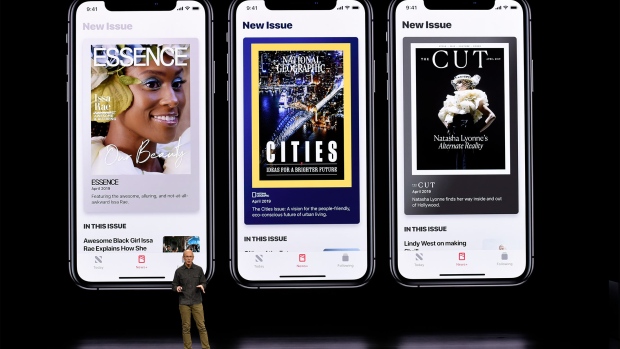Mar 25, 2019
Apple launches US$10-per-month magazine, news subscription service
, Bloomberg News

Apple Inc. presented its long-anticipated magazine subscription service on Monday, bundling access to selected glossy titles, websites, and newspapers for US$10 a month.
The new service, called Apple News+, will be incorporated into the existing Apple News app that comes pre-installed on iPhones, iPads, and Macs, Roger Rosner, vice president of applications, said Monday at an event at Apple’s Cupertino, California, headquarters.
More than 300 magazines will be part of the service, he said. It will also include The Wall Street Journal and Los Angeles Times, but not The Washington Post or The New York Times. Bloomberg Businessweek will be part of the magazine section. A demonstration showed that some magazines, like National Geographic, have dynamic, moving covers.
The service launches today for US$9.99 a month, with the first month free. It will be available in the U.S. and Canada, with the U.K. and Australia coming later in the year.
The News+ service will be its own tab in the existing News app and won’t interrupt the free section, the demo showed. Magazines can be downloaded automatically for offline reading. The News+ tab features access to magazine cover stories, new issues, and individual articles. Magazine creators are tweaking their issues depending on whether the story is read on an iPhone or the bigger iPad screen.
The magazine bundle is part of a collection of new services Apple is rolling out as it seeks to boost revenue from sources other than the iPhone.
The magazine service is based on an application called Texture, which Apple acquired about a year ago. Texture had agreements with more than 200 magazines. Some publishers have reportedly balked at the terms Apple offered to be part of the magazine bundle.
Apple launched a News app in 2015, letting users follow topics that suit their interest, subscribe to individual publications and read selected articles for free. Apple has an internal team that decides which news stories are shown to users. The News app was not Apple’s first foray into the business, however. It followed Newsstand in 2011 that allowed people to download and display digital versions of newspapers and magazines on their mobile devices.








